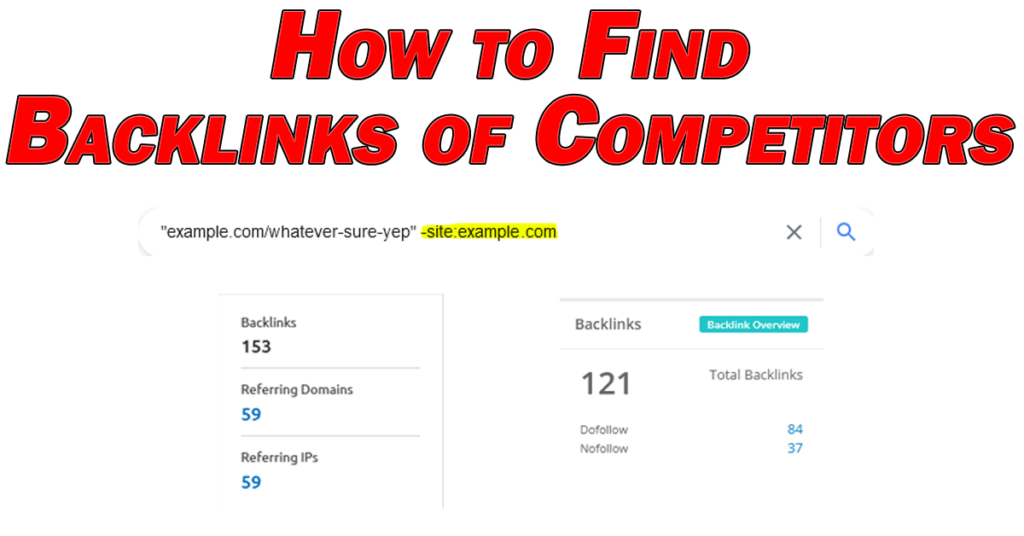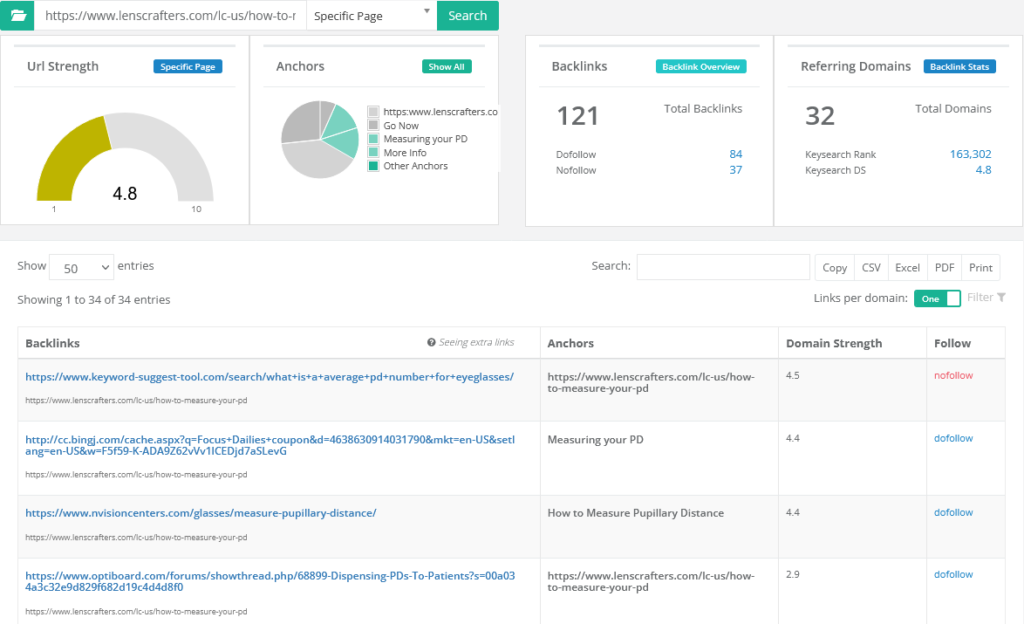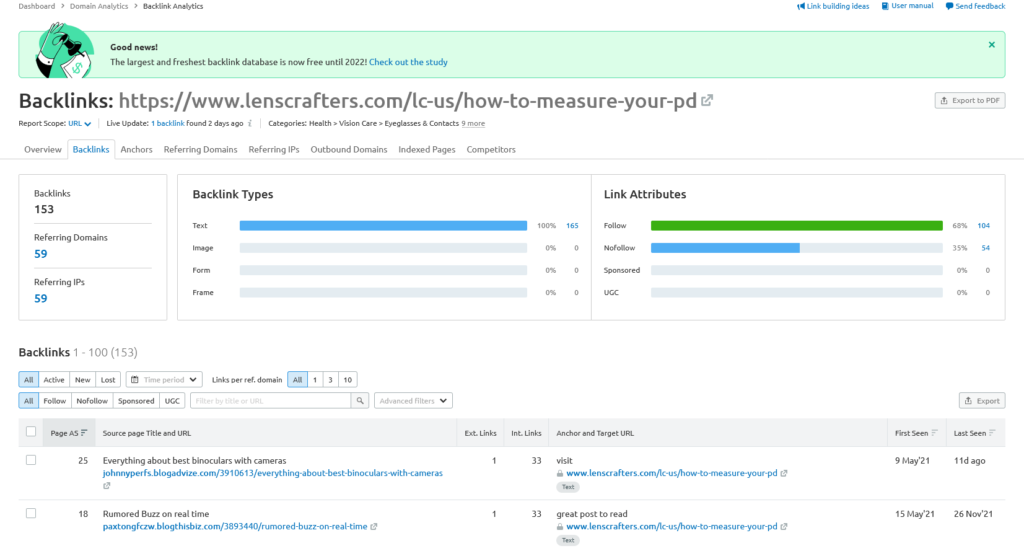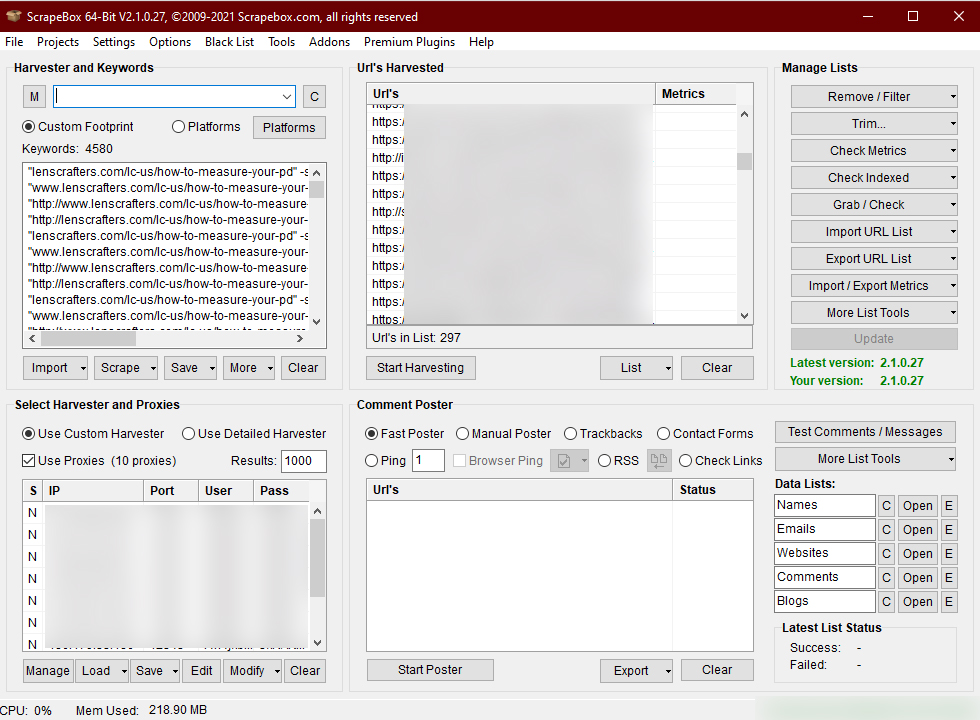I’ve witnessed the landscape of search engine optimization change a considerably over the last decade. And while a lot of things which once worked don’t anymore, some SEO techniques are evergreen.
One of these which I recently named my best SEO tip is the power of quality content.
But without a doubt, a close number two is the powerful effect which backlinks can have on a page’s ranking in Google.

When a website which is already trusted by and consequently ranking well in Google links to another page, that’s a positive sign for that page. That says to Google that that page has content worth sharing and potentially ranking well itself.
As such, webmasters devote great resources to finding and getting backlinks for the pages they want to rank well.
A good place to begin looking for relevant, high quality backlinks which will provide the biggest benefit to your ranking is through your competitors.
It stands to reason that the links which are helping your competitors to rank well would undoubtedly do the same for you.
This brings us to the million dollar question: how to find backlinks of competitors?
There are several different ways to do this, so let’s look at the options.
How to Find Your Competitors Online
I’m assuming you already know who your competition is in the SERPs.
If you don’t, the easiest way to find your competitors online is to just do a Google search for your niche.
Do a few searches for the keywords you’re targeting and you’ll quickly find a top 10 list of your competition in the form of Google’s search results.
The more keywords of yours the same website or sites are ranking for, the closer that competition is to you.
Not only are these your competitors, but these are the pages which we want to find backlinks for to send back to the relevant pages on our site.
How to Find Backlinks of a Website Using Google
Let’s start with the simplest (and cheapest/free) option for finding backlinks of competitors: Google itself.
By inputting the appropriate search, Google will filter its results to just show you web pages which are linking to a site or a specific page.
For our purposes, this makes it a reliable method of how to find backlinks of competitors.
Let me give an example about how you might apply this to your site.
Let’s say we have a health and wellness blog and have written an article about eyesight.
The keyword phrase we targeted in that article and want to rank for is “how to measure pd”.
By doing a search for that keyword in Google, the first organic listing is from “Lenscrafters.com/lc-us/how-to-measure-your-pd”.
To see a list of web pages which are linking to that specific page, we can then input the following into Google exactly as written below:
“lenscrafters.com/lc-us/how-to-measure-your-pd” -site:lenscrafters.com
By including the quotes, we are limiting search results to pages which explicitly have that text on them, which in all likelihood means a live backlink to that Lencrafters page.
You’ll note that there’s no http or www included ahead of the domain in that search.
Including them would only filter out variations of the URL in our search results. You will get the biggest return in results by omitting the HTTPS and WWW, thus ensuring that you get all variations of the URL.
After the URL we have the -site operator. This removes any pages from the domain itself which are linking to that page from appearing in the Google results. We just want to focus on external links, and that operator does that for us.
So with that specific search, Google will show us every page which is linking to the URL in question with the URL itself. In other words, it’s showing us the backlinks for that competitor:

Clicking on each of those pages, we’ll find a link to that page. Like whenever you’re searching for backlinks of your competitors, it’s unlikely that you’ll be able to replicate most of them to your own site.
Still, the first two returned pages (same domain) in the example search above are directories which have links to multiple pages on the topic of measuring PD. I would assume that it would be relatively easy to get our page added to that directory to get a backlink.
The third page is a forum. While forums always have their own rules about posting links, this would likely be another easy link to pick up for our page.
While we easily found nearly a dozen linking opportunities in seconds, the “Google” method comes with one major drawback: it omits pages which are using anchor text to link to the URL.
So if a website links to that URL but uses anchor text like “how to measure PD” or “on Lenscrafter’s website” for example, we won’t see those links in Google.
This is unfortunately a major limitation to the approach of how to find backlinks with Google. It’s free and it’s easy, but it leaves a lot of links on the table.
You can still build a nice pool of potential backlinks to pursue for your site by repeating this process with the rest of the top 10 or more ranking pages for your keyword, but there’s always that limitation.
This is why premium tools are so popular.
Premium Backlink Checkers
KeySearch
KeySearch has been my SEO swiss army knife for the last year since it become my go-to keyword tool. I most focused on its keyword tool aspect in my KeySearch review, but it has a lot more to offer, including a backlink checker:

You can supply a specific page or just look at the domain overall to see their respective links.
As you can see, KeySearch found many more links than the Google method did for that same URL.
The tool gives a rundown of the links themselves, the anchor text used (including plain URL specific ones), the strength of each linking from domain, and the follow status of each.
You can limit links from each domain to one if a domain is sending multiple links to the page.
The filtering options allow you to focus on higher value links from domains with more authority, filter out no or dofollow links, and specify domains.
You can also see a breakdown of the different, most predominant anchor texts used with the URL via the graph at the top.
Very importantly you can also export custom reports if you need to share this with a superior, someone else on your team, or just for your own purposes.
SEMrush
SEMrush is another all-in-one SEO tool, albeit a more extensive and much more expensive one.

In helping myself to a temporary free membership, I plugged our same URL in and got some different results.
Much of the presented information is the same between SEMrush and KeySearch (anchor text, URL, title, follow vs nofollow, a page strength score, etc.)
You’ll notice that we got more backlinks and referring domains with the SEMrush report. It’s normal to get some variations between multiple tools as no one tool will find every single link pointing at a page.
This is why it helps to consult multiple tools if you want the most complete backlink profile for a page, aggregating the results and filtering out duplicates.
We also get a bit more in depth information about the links themselves with SEMrush, including the number of internal and external links on those linking from pages. It also tells us the age of the links and can show links which were detected in the past, but not anymore.
This can also account for the difference between SEMrush and KeySearch’s links.
If you have the budget, SEMrush is a great way to go. But at over $100 a month on the lightest package with SEMrush, you can get a full year of KeySearch for less.
The same holds true for the other popular options (Ahrefs, Moz, etc.). They’re all pretty solid for giving detailed information on backlinks, but they’ll make you pay for that information.
As an aside, one funny takeaway from this experiment after looking at the same URL with multiple backlink tools is that Lenscrafters has some dodgy, low quality links pointing to their page.
I’d venture to guess it’s the internal links pointing to that page which are helping it rank rather than the external websites.
Scrapebox
When I think backlinks I think Scrapebox.
Scrapebox is an affordable premium tool which lands somewhere between searching for backlinks manually via Google and using one of the previous mentioned services/tools.
The tool is basically doing a Google search but on steroids.
One of its many applications as such is to find backlinks to any URL you supply it with.

You can just input the URL you want to find backlinks for along with the -site (or not as you can filter them out of the results on the right) and click “scrape”.
This will give you tons of results which you can then filter and organize accordingly with all of the options on the right. In fact, the data sorting, trimming, and organizing is another very useful feature of Scrapebox.
Again, you’re limited to URL links rather than anchor text here just like doing a Google search.
That said, Scrapebox will give you the most complete profile of URL based links as you can easily “merge” your keyword (in this case your URL) with lots of random character which shakes the Google tree to identify more linking opportunities.
It’s not pretty, you need to use proxies whenever you use the tool otherwise you’ll get your IP banned, and it’s not as in depth as the information you get with other tools, but it’s highly effective and a great one-time purchase tool if you know how to use it.
Finding Backlinks to a Site Versus a Page
You’ll note that in these examples, I limited my search to find backlinks to the specific page which was ranking for the keyword I was targeting.
This is opposed to just finding all of the backlinks with an entire domain is receiving.
There’s pros to doing both while you’re trying to find backlinks of your competitors.
Page Specific Backlinks (Quality Over Quantity)
I’ll always begin with page specific backlinks for a couple reasons.
First, those backlinks are going to be much more targeted and relevant to the page of mine I want them to link to. More relevant links are always going to be more valuable in the eyes of Google. They also obviously send more targeted traffic to your page which improves user engagement on your site.
Secondly, these links will likely be easier to replicate for my site because they’re so targeted. Whether it’s a backlink we can create ourselves on the site or one we need to solicit to the webmaster (on the strength of our GREAT content), it’s going to raise their eyebrows if we want a link from their site which has little to do with our page.
Domain Backlinks (Quantity Over Quality)
Once I’m finished finding the backlinks for a specific URL, I might widen the search to check ALL the backlinks that domain is getting across the board.
This includes links pointing to the home page as well as all of the other content pages like the one we initially found.
Here you get more of a quantity over quality situation as you’ll obviously find considerably more backlinking opportunities with a wider net which a domain search accomplishes.
I might do this because I didn’t find enough backlinks from an individual page on that site, but only when the domain itself is relevant to my niche.
In other words, if one of the top ranking pages for “how to measure PD” is an article from a news website, there’s no point in looking at that site’s overall backlink profile. This would only turn up a ton of links from sites which are irrelevant to our niche.
If one of the top ranking pages for that keyword is completely focused on our niche, that’s the kind of site I might do a domain backlink check for.
In other words, your closest competitors are the sites which merit performing an in-depth search into their backlink profile.
In Summary
In summarizing how to find the backlinks of competitors:
- You can find the pages you’ll want to analyze for backlinks by doing a Google search for your keyword.
- A specific, operator based Google search like demonstrated above is effective for finding a page’s backlinks, but it limits the backlinks you can find.
- Premium tools are effective for attaining a larger backlink profile for a page or domain, but they come at a price. The more you spend, the more data you’ll receive.
- No single tool will find every single backlink to a page. For the most complete profile, consult multiple tools/processes and aggregate the results.
- Repeating the process for every page in the top 10 for your keyword gives you a much more complete backlink profile to try to replicate, arguably more complete than any of the currently ranking pages.
- Backlinks to the pages ranking for the keyword you’re targeting are the most valuable for your page.
- Remember that most backlinks can’t be (easily) replicated. To improve your odds, make sure that your content is of the highest quality and laser focused in terms of relevancy to the page you want a link from.
